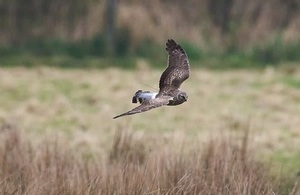Innovative licence issued to help hen harrier
Action forms part of the Defra Hen Harrier Recovery Plan.

Natural England has today issued a licence permitting the trial of a brood management scheme of hen harriers with the long-term aim of increasing their numbers across England.
The licence is time-limited for a 2-year period and places stringent conditions on the trial, which will take place in the northern uplands of England. Brood management will only take place with the permission of the land owner.
Brood management is the sixth action within the Defra Hen Harrier Recovery Plan, ultimately aiming to reduce hen harrier predation of grouse chicks on driven grouse moors, leading to an improvement in the conservation status of hen harrier.
The licence permits the removal of hen harrier eggs and/or chicks to a dedicated hatching and rearing facility, where they will be hand-reared in captivity, before being transferred to specially-constructed pens in hen harrier breeding habitat, from which they are then re-introduced into the wild in the uplands of northern England. This intervention may only occur where hen harrier nests have reached an agreed density.
Natural England experts have rigorously scrutinised the licence application and will work closely with the licence applicant throughout the duration of the trial to ensure that all elements are carried out proportionately and effectively, to bring about the best possible outcome for hen harriers.
Natural England Chairman, Andrew Sells, said:
Improving the conservation status of hen harriers across England is something I feel very passionate about. The principles of this trial have been carefully researched by those best-placed to understand the conflict which can occur between hen harriers and driven grouse moors.
It is a complicated and emotive picture and we have considered this application very carefully. Licensing this trial will allow important evidence to be gathered which, I sincerely hope, will lead to a self-sustaining and well-dispersed breeding population of these beautiful birds across England.
Amanda Anderson, Director of the Moorland Association said:
The Moorland Association is delighted that Natural England has issued a ground-breaking research licence to test if brood management will help improve the Hen Harrier population and range in upland northern England. The Hen Harrier Brood Management Group has sought to provide a pragmatic solution to a proven predator-prey conflict while safeguarding important land use.
Moorland managed for red grouse contributes significantly to remote rural communities, businesses and treasured landscapes. This new wildlife management licence will give land mangers confidence that impacts of hen harriers breeding on their land can be minimised creating a win-win scenario.
Dr Adam Smith of the Game & Wildlife Conservation Trust said:
GWCT research has over many years described the tension between grouse moor management and hen harrier conservation. We believe it important that the hen harrier recovery plan includes this practical trial of a well understood raptor conservation tool, the brood management scheme. If successful this approach should help hen harriers and red grouse thrive - in the interests of both, and of moorland.
Further information
We have published a redacted version of the full licence issued and the application submitted.